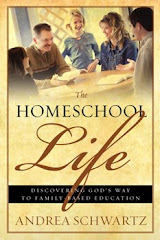A credential is an attestation of qualification, competence, or authority issued to an individual by a third party with a relevant de jure or de facto authority or assumed competence to do so.
The word credential has a similar root to the word creed. So, credentials are based on beliefs. In other words, someone or some group or institution has to attest to or "believe" that what one professes to know is, in fact, true and reliable.
Often when my daughter meets adults who discover that she is homeschooled she will be quizzed regarding the credentials of her teacher. Just the other day she was playing golf with a very pleasant man who asked her if her mother was a mathematician. My daughter's response, "No, but she's a very good teacher." Can you imagine that man asking a student from a public school if his teacher was a mathematician? It is assumed (despite ample evidenced to the contrary) that a child educated in a state school has better, more qualified teachers than does a homeschooled student. Credentials are subjective. Whereas many in homeschooling circles view me as an expert, those who are unfamiliar with home education OR who don't share my world and life view might consider me unqualified. Credentials are truly in the eyes of the beholder.
As the saying goes, the proof of the pudding is in the tasting. It isn't so important where one learns as that one learns. One would imagine this would be universally accepted if the primary reason for compulsory education was to impart true knowledge rather than to indoctrinate students with a particular worldview. Therein lies the real problem with Christian education from a secular perspective. Students who learn in a Christian setting are not being fed a steady diet of humanistic, materialistic, pluralistic, and/or atheistic content and may have opinions that deviate from the "norm." How inconvenient if you want to produce robotic responses to the issues and concerns of life!
Over the course of my homeschooling tenure, I have become quite knowledgeable in many areas. Some might call me an expert, or at least, attribute some degree of expertise to my knowledge. These areas have coincided with those things that are important to me and in which my children regularly participated. Sure, I've outsourced some of the instruction (specific academic subjects, music, and athletics), but because I was actively involved, I have been able to act as a coach or mentor in many areas with a huge body of knowledge at my disposal.
One Saturday afternoon while I was helping my daughter prepare for an upcoming golf tournament, I was approached by a man asking for my assistance with his putting stroke which he claimed was ballooning his golf scores. He was sure I was I was a golf teacher after watching me work with my daughter. I assured him that I wasn't, just merely a parent helping her child. After watching me work through drills with her, he approached me repeatedly asking for my help. I relented because the more I told him I was not a coach, the more he was convinced that I was just being modest, aloof, or too busy for him. He told me he was about to go play with his buddies and he needed help. So, I asked him to putt and I would watch him and tell him what I thought. After about five minutes I motioned him back. "You're lifting your head too soon. Keep it down and you'll drain more putts."
Now every golf book in print will give this same advice. And, my newly acquired student looked like the sort who had read them all. But after hearing this critique from "an expert," he made putt after putt. He was quite excited and practically hugged me. "Now," he said, "I'm ready to go out and beat those guys! I knew you were a golf coach!" I can only imagine how he boasted to his fellows about the free golf lesson he received that day.
I guess credentials truly are in the eyes of the beholder!









No comments:
Post a Comment